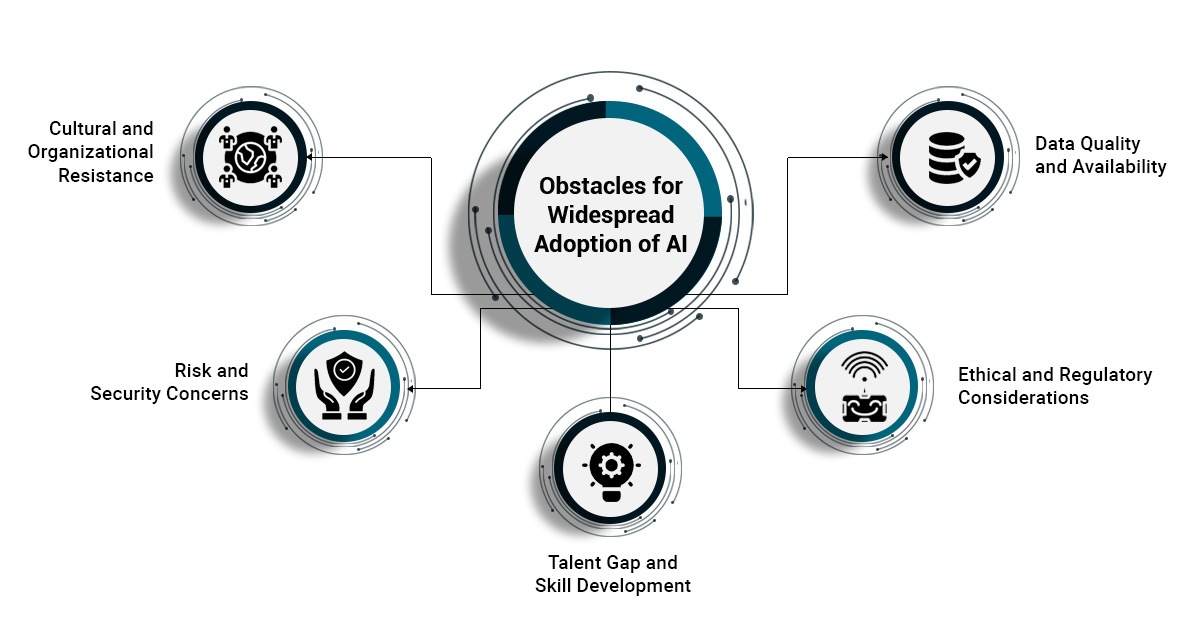
Artificial Intelligence has been a game-changer in numerous industries, revolutionizing the way businesses operate. In the realm of financial services, AI holds immense potential to streamline processes, enhance decision-making, and unlock new avenues for growth. However, despite its promising prospects, the widespread adoption of AI in the banking and finance sector faces several obstacles. Discover the challenges, intricacies, benefits, barriers, and possibilities of AI adoption in the investment banking sector as we delve into the seamless integration of AI.
Before we delve into the obstacles, it's essential to recognize the significant benefits of AI brings to the investment banking sector. AI has the power to transform investment banking operations by automating repetitive tasks, improving data analysis, and providing valuable insights.
Here are a few key advantages of AI adoption in the financial services industry:
Enhanced Efficiency: AI technologies bring the power of automation to investment banking, enabling the automation of repetitive tasks such as data entry, risk assessment, and compliance checks. By relieving human resources from these mundane activities, AI frees up valuable time and allows professionals to focus on more strategic and value-added tasks.
Improved Decision-Making: AI-powered algorithms possess the remarkable ability to process vast volumes of data, swiftly identify patterns, and generate real-time insights. This empowers investment bankers to make well-informed decisions based on accurate and up-to-date information, ultimately reducing risks and increasing the likelihood of successful outcomes.
Enhanced Customer Experience: AI-driven chatbots and virtual assistants have emerged as valuable tools in the realm of customer experience. These intelligent agents enable personalized interactions with customers, offering real-time support, assistance, and customized recommendations. By providing a seamless and tailored experience, AI enhances overall customer satisfaction and loyalty.
Fraud Detection and Prevention: The realm of investment banking is not without its share of risks, including the ever-present threat of fraud. AI algorithms possess the remarkable ability to analyze vast volumes of transactions, detect anomalies, and identify potential fraudulent activities. By swiftly flagging suspicious behavior, AI assists financial institutions in safeguarding themselves and their customers from malicious activities, bolstering trust and security.
The integration of AI in the investment banking sector brings forth a multitude of benefits. From automating tasks and enhancing decision-making to improving customer experiences and fortifying security, AI empowers financial institutions to navigate the complex landscape with greater efficiency and effectiveness. Embracing AI technologies holds the potential to unlock new horizons of growth and prosperity, transforming the investment banking sector into a realm of unparalleled possibilities.
While the allure of AI adoption in the investment banking sector is undeniably captivating, several formidable challenges hinder its widespread integration. Let us embark upon a quest to unravel these obstacles that financial services companies encounter in their pursuit of harmonious AI incorporation:

Data Quality and Availability At the very heart of AI algorithms lies the pivotal role of data, acting as the lifeblood that fuels accurate predictions and profound insights. Yet, financial institutions find themselves entangled in a web of hurdles when acquiring high-quality, structured data. These barriers manifest as data silos, archaic legacy systems, privacy concerns, and the labyrinthine complexities of regulatory compliance. The scarcity of consistent and comprehensive data can significantly hamper the efficacy of AI models. To surmount this challenge, organizations must invest in rigorous data quality management practices, forging resilient data governance frameworks.
Ethical and Regulatory Considerations As the potent forces of AI continue to evolve, a momentous shift occurs, necessitating the utmost reverence for ethical and regulatory principles. Financial services companies must navigate treacherous waters, ever vigilant for potential biases that may permeate their AI algorithms. Transparency and accountability must reign supreme in decision-making processes, ensuring that customers and stakeholders are bestowed with trust and confidence. Complying with data protection and privacy regulations, such as the formidable GDPR and CCPA, becomes an imperative cornerstone of AI adoption in the investment banking sector. Striking a harmonious balance between innovation and ethical fortitude emerges as a profound necessity.
Talent Gap and Skill Development The successful implementation of AI demands a host of skilled individuals who possess the prowess to harness its boundless potential. Alas, there exists a conspicuous dearth of professionals equipped with the necessary expertise in AI technologies, machine learning, and data analytics. Overcoming this formidable obstacle necessitates strategic investments in comprehensive upskilling and reskilling programs. Collaborations with esteemed academic institutions serve as beacons of enlightenment, casting light upon the path to bridging the talent gap. Fostering a culture of perpetual learning and relentless innovation emerges as a clarion call to conquer this challenge.
Risk and Security Concerns In the pursuit of AI's embrace, the intoxicating allure of its benefits comes intertwined with a tinge of trepidation. The use of AI models for decision-making propels financial institutions into a realm where concerns about algorithmic biases, potential errors, and a lack of explainability loom ominously. To navigate these perilous waters, financial institutions must imbue their very fabric with robust model validation, testing, and risk management frameworks. Diligent oversight and incessant monitoring serve as stalwart guardians, unveiling potential risks and enabling their timely mitigation. Only through such unwavering vigilance can the reliability and security of AI-driven processes be safeguarded.
Cultural and Organizational Resistance The integration of AI into well-established organizational structures and workflows oftentimes encounters resistance from employees ensconced in the comfort of traditional methods. A lack of awareness, the specter of job displacement, and skepticism regarding AI's capabilities act as formidable barriers to adoption. Organizations must embark upon the arduous journey of change management, fostering a culture that reveres collaboration and innovation. Clear communication and comprehensive training programs serve as the key to assuaging concerns and nurturing an environment conducive to successful AI adoption.
AI adoption in financial services holds immense potential to transform the investment banking sector. However, several obstacles hinder its widespread implementation. Overcoming data quality and availability challenges, addressing ethical and regulatory considerations, bridging the talent gap, managing risk and security concerns, and navigating cultural resistance are crucial for successful AI integration. By recognizing and addressing these obstacles, financial services companies can harness the power of AI, unlocking new opportunities for growth, efficiency, and customer satisfaction. Embracing AI in the investment banking sector is not just about technology; it's about a mindset shift towards innovation, collaboration, and continuous learning to thrive in the era of AI-powered finance.
Q- Will AI replace human jobs in the investment banking sector?
A- AI will automate certain tasks and roles, but it is unlikely to entirely replace human jobs. Instead, it will augment human capabilities, enabling professionals to focus on higher-value tasks such as strategic decision-making, relationship management, and complex problem-solving.
Q- How can investment banking professionals prepare for a career in AI?
A- Investment banking professionals can prepare for a career in AI by acquiring skills in data analytics, machine learning, and programming languages. Engaging in continuous learning, attending industry conferences, and participating in AI-focused projects or courses will enhance their expertise and make them valuable contributors to AI adoption efforts.
Q- What are the potential career opportunities in AI within the banking and finance industry?
A- The integration of AI in the banking and finance sector opens up a wide array of career opportunities. Professionals with expertise in AI can pursue roles such as AI strategist, data scientist, AI model developer, AI project manager, and AI consultant. These roles involve leveraging AI technologies to drive innovation, enhance decision-making processes, and optimize business operations within the realm of banking and finance.
Q- How can AI benefit customers in the banking and finance sector?
A- AI brings several benefits to customers in the banking and finance sector. It enables personalized experiences through AI-driven chatbots and virtual assistants that provide real-time support and assistance. AI algorithms can analyze customer data and preferences to offer tailored recommendations for financial products and services. Additionally, AI-powered fraud detection systems help protect customers from unauthorized activities, enhancing security and trust. Overall, AI enhances the customer experience by delivering efficient, personalized, and secure financial services.
Q- What are the potential risks associated with AI adoption in the banking and finance sector?
A- While AI adoption brings significant advantages, it is important to be aware of potential risks. These include algorithmic biases that may lead to unfair outcomes, challenges in interpreting and explaining AI decisions, and the risk of cyberattacks targeting AI systems. Financial institutions need to implement robust governance frameworks to address these risks and ensure responsible AI use. Striking a balance between innovation and risk management is crucial to leverage the full potential of AI while safeguarding the interests of customers and stakeholders.